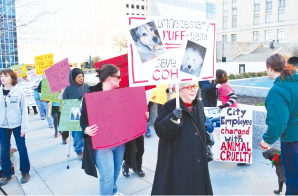
By Leslie Collins
Northeast News
December 28, 2011
Chain of Hope just wants the city to throw them a bone.
But the city quips rules are rules.
For nearly two years, Chain of Hope has operated in Kansas City, rescuing dogs and cats from deplorable conditions, finding homes for pets and providing financial assistance to pet owners needing spay and neutering services, vaccinations or food for their pets.
During a recent inspection of the organization’s headquarters at 2708 Tracy Ave., the city discovered some issues. As a result, the city gave Chain of Hope 15 days to vacate the property, said Chain of Hope Founder and Director Kate Quigley.
A neighborhood complaint, that the organization was operating an animal shelter in a residential neighborhood, led to the investigation. Inspectors from both the city’s Planning and Development Division and Neighborhood and Community Services Department visited the residence in mid-December. A Neighborhood Community Services inspector found a total of nine animals inside: three adult dogs, two kittens and four puppies.
“A couple of the puppies were old enough that it was questionable if they were old enough to be counted toward the number of adult dogs present,” said David Park, director of the Neighborhood and Community Services Department.
Originally, Chain of Hope applied for a domestic avocation permit, but failed to secure a signature from one neighbor. That’s when Chain of Hope began following the guidelines for regular residents. Kansas City allows residents to keep a total of four grown pets, but there’s no limit to the number of animals under four months of age. As a result of the questionable ages, the inspector issued a ticket. However, if Chain of Hope can provide the proper documentation, the ticket will be dropped, Park said.
“At the same time, a zoning inspector went out and talked to them and found out it’s not being used as a residence at all,” Park said. “They’ve got their offices set up. Non-profit, good organization or not, it’s still a business in a residential neighborhood.”
That led the zoning inspector to issue a standard notice of violation on Dec. 16, which identified the violation and gave the organization 15 days to appeal or abate the violation, said Wilson Winn, division manager of investigations in the City Planning and Development Department. Quigley argued she wasn’t in violation since Chain of Hope is a non-profit organization, not a business.
A needed service
Six days a week, Quigley and her volunteers drive through alleys and residential streets searching for neglected dogs and cats. They’ve seen animals with detached eyeballs, embedded collars and those suffering from emaciation. On average, they receive 30 calls for service per day with many coming from Historic Northeast, Quigley said.
“That’s one of our heaviest working areas,” she said.
East side resident M. Queen witnessed the benefit of Chain of Hope firsthand. When she discovered an abandoned three-year-old Shar Pei with health issues in front of her house, she called the organization. Quigley took the dog to the vet, found it a foster home and then a permanent home, Queen said.
“She gets in the trenches and really gets out there no matter what,” Queen said of Quigley. “She risks her life coming into some of these neighborhoods.”
“Sleet or snow, she’s out there,” Donna Woods, a volunteer, said of Quigley.
“It’s dirty work and she’s willing to do it,” Volunteer Cynthia Steele added.
For Quigley, rescuing animals is a calling. Her organization, which operates with volunteers and by donations, helps fill the gap left by animal control, she said.
“I really wanted to be proactive, get out in the hood and help these animals and these people, so the animal didn’t have to end up at the animal shelter,” Quigley said.
However, the city is making that mission difficult to accomplish, she said. On the Chain of Hope website, Quigley wrote, “We are being aggressively and unfairly targeted and harassed by the very people who should be thanking us for going out there day after day and trying to make a positive difference for abused and neglected animals.”
“We’ve had so much trouble with the city trying to get it straightened out,” said Chain of Hope’s Landlord Pam Weaver. “You call three people on any given day and you’ll get three different answers. The departments aren’t working together to tell us what we need to do to stay in there.”
In terms of the zoning violation, Weaver said, “They should have told us months ago.”
City’s perspective
As far as the city’s perspective, the line of communication has become broken.
“The information has been grossly distorted about how we’re going to evict them. Nobody’s going to evict them,” Winn said. “If they believe we are in error, they can appeal that (zoning violation) notice within 15 days or cease operation or pursue other avenues.”
Chain of Hope can also request an extension, he said.
“Her (Quigley’s) basic flaw is animal control rules allow any given person that resides in a house to have up to four animals,” Winn said. “It doesn’t say you can take a house and house animals there when no one’s living there.”
Making someone live there full-time isn’t a quick fix for the organization. Once Quigley begins using volunteers or employees, it becomes a business, he said.
“They have no kind of permit to operate a kennel or shelter there,” he said.
Asked if Chain of Hope had been singled out, Winn said “no” and that the city was simply responding to a neighborhood complaint.
“It comes down to the simple question of, ‘Is what they’re doing in the house an allowed use in a residential district?’ And the answer is, ‘No,'” he said. “As a division manager of investigations, I admire what they’re doing. I’ve been a dog owner for most of my adult life. I understand pets. I appreciate pets.
“I believe there’s a need for service, but it has to be in the appropriate location.”
















